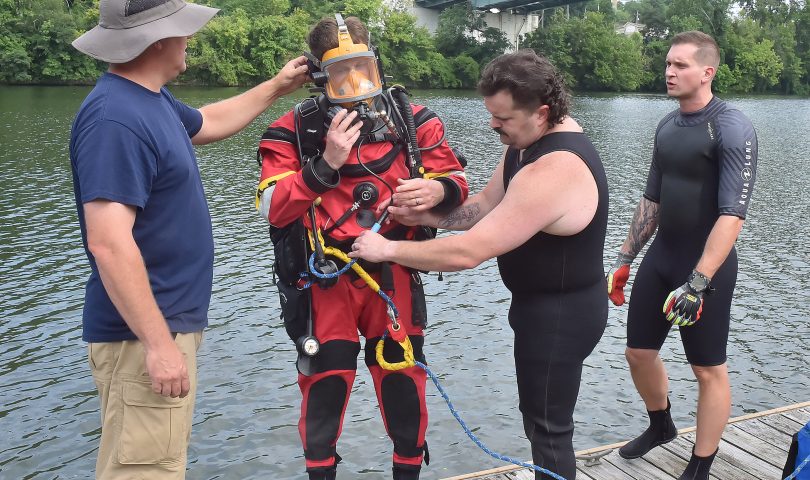Have you ever played the “dive for treasure” game at a swimming pool, where a non-floating object is tossed into the pool and kids dive in to find it?
To an untrained eye, it may have looked like members of the Morgantown Fire Department Dive Rescue Team were diving for treasure from a dock by the amphitheater at Hazel Ruby McQuain Park on Thursday.
What they were actually doing was a training session for weapon recovery in the Monongahela River.
MFD Lt. Douglas Sharpe and Lt. John Moore, both experienced divers, ran surface support for the training, noting any problems the divers faced and recording the amount of time it took them to recover the object.
Sharpe said before COVID, the department held training like this one about twice a month.
“At that point I think we had like 19 divers,” he said. “But now with budgets and stuff we are back down to trying to do it once a month.”
The lieutenant said what they focus on for each training can vary from evidence or weapon recovery to body recovery and everything in between.
Thursday’s training focused on finding guns that had been tossed in the river. Sharpe and Moore tossed a large BB gun into the water and the tender and divers practiced search patterns to recover it.
The tender, firefighter George Calvert for this training, runs the search patterns and holds the line connected to the divers, directing them when to stop and turn around via radio communication.
Divers firefighters 1st class Tanner Dalton and Anthony Stake and Lt. Mitchell Beall searched for the gun mainly with their hands feeling along the bottom of the river.
Once a diver found the gun and brought it to the surface, the time it took to recover was recorded and the gun was tossed right back into the water for them to start again.
Sharpe explained that how far into the river they will search and how much rope is let out for divers usually depends on what they are searching for.
“If we are searching for a body, most bodies will be 5-6 feet out, so we’ll let 4-5 feet out,” he said. Things like guns could be found a little further out.
For rescues and recoveries further from the shore, boats and sonar equipment are used to locate a target to dive to, then divers will follow that mark to search the area.
Sharpe said it is important to keep up on continued training, since it’s not something the team does on a daily basis.
“It’s a diminishing skill. If you don’t use it, you lose it,” he said. “The more you do it, the more comfortable you get — the more comfortable you get, the easier it is.”
While the majority of members on the dive rescue team are from the MFD, it is a combined team with other local agencies.
Currently, there are 33 divers on the team — 18 from the fire department, six from Morgantown Police Department, nine from Granville and one from the EMS office. The majority of the equipment for the team comes from MFD and is purchased through grants from Homeland Security and other agencies, Sharpe said.
“The sonar and stuff is a Pittsburgh Port Authority grant, so anything that Pittsburgh Port Authority covers — if they call — we have to come assist,” he said.
Sharpe said the equipment used by divers is similar to standard scuba gear with a few upgrades like specialized face pieces.
Sharpe said rescue divers also have larger buoyancy compensators, which is a type of equipment worn by divers to establish neutral buoyancy underwater and positive buoyancy at the surface. It helps them stay at the bottom when they need to and to float on the top when they need to do that.
“We need to stay on the bottom — if there’s current it will start pulling us up, so we have to be a little more weighted than you would for a normal recreational scuba dive,” Sharpe said.
Sharpe and Moore said most of the dive team’s action is seen outside Morgantown city limits, but they can assist any department when called.
“We can travel,” Moore said. “We definitely go out of the city. We’ve been down to Sutton Lake and Clarksburg and up to Chester (Pa.,) and Steubenville (Ohio).”
“We haven’t made any rescues but that’s usually because it doesn’t happen here,” Sharpe said. “It happens at Cheat Lake and by the time we get out there it’s already an hour into it because they might not call us immediately.”
TWEET @DominionPostWV




